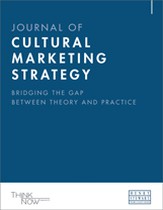Emotionality differences between a native and foreign language: Implications for cultural marketing strategies
Abstract
Understanding the factors that influence the emotional resonances of messages shown to bilingual speakers is an important consideration when marketing in communities where several languages are used. Bilingual speakers have long reported that emotional phrases feel stronger in their native language than in their foreign language. Examples include swear words, insults, ‘I love you’, and also marketing slogans. The feeling of reduced emotionality has been referred to as ‘emotional blunting’. Emotional blunting is most reliably found for lower proficiency languages, foreign languages and languages restricted to work-place use. Emotionality differences have been proposed to be an outcome of human associative memory: the emotional resonances in the discourse context accrue to words and phrases as part of normal use. When asked to make decisions in their foreign language, bilingual speakers have been shown to be less influenced by the emotional aspects of the decision, but the second language may sometimes be more emotional, such as when emotional terms have been experienced more frequently in a specific language. This has implications for the emotional echoes generated by product names. This paper reviews these phenomena and the implications for multicultural marketing.
The full article is available to subscribers to the journal.
Author's Biography
Catherine Caldwell-Harris is associate professor at Boston University and directs the Psycholinguistics Laboratory in the Department of Psychological and Brain Sciences. She brings her cognitive science training to a range of interdisciplinary questions. Foremost among these is the intersection between language and emotion. She has written extensively on how the emotional resonances elicited by language differ for bilinguals’ native and foreign language, beginning with her seminal study demonstrating that skin conductance amplitudes were larger when bilingual speakers listened to emotional phrases in their native language compared to a foreign language. Her diverse investigations into the emotions associated with language include lying, responding to police interrogations, joking and evaluating trolley (and other) dilemmas. Dr Caldwell-Harris’ cross-cultural work in China investigated why American and Chinese cultures differ in frequency and comfort in expressing ‘I love you’. Department of Psychological and Brain Sciences, Boston University, 64 Cummington Mall, Boston, MA 02215, USA
Ayse Aycicegi-Dinn graduated from Istanbul University and completed her master’s degree at Bogazici University and her PhD at Marmara University. She conducted post-doctoral research at American University, Washington, DC, and became a visiting scholar at Boston University, Boston, MA. Aycicegi-Dinn has worked as the vice chair and chairperson of the Department of Psychology at Istanbul University, where she also served as vice rector. She has led several national and international projects in the field of cognitive psychology. Her translated credits include cognitive psychology books translated from English into Turkish. Dr Aycicegi-Dinn’s research fields include neuropsychology, and research conducted for Turkey’s Scientific and Technological Research Council, Tubitak, included cross-cultural psychology and psycholinguistics. Her cross-cultural projects have compared individualism and collectivism in America and the USA. A recent study examined lower reported ‘vertical collectivism’ (ie respect for hierarchy and obeying authority figures) in urban environments compared to rural regions within Turkey. Dr Aycicegi-Dinn’s research conducted for Turkey’s Tubitak involved measuring personality variables, motivation, foreign language learning outcomes and skin conductance responses during language tasks among Turks learning English, including those enrolled in English medium instruction within Turkey. At present, Ayse Aycicegi-Dinn is chairperson of the Department of Psychology at Istanbul 29 Mayis University.
